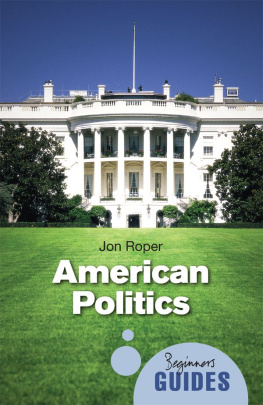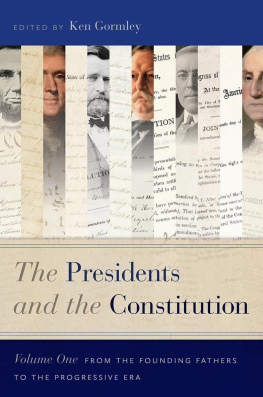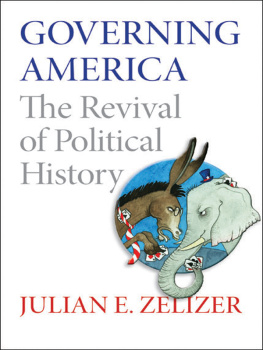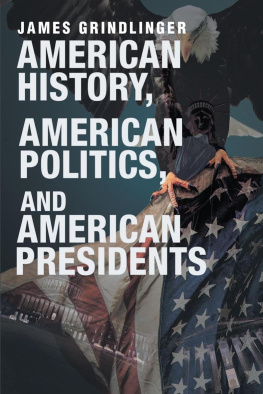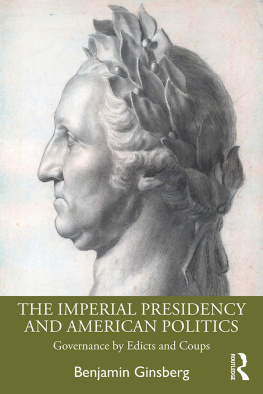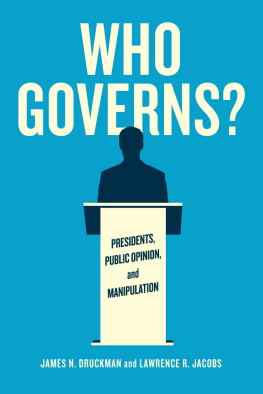American Politics:
A Beginners Guide
John Roper has long been one of the most astute foreign observers of the American political scene. This fine book promises a general introduction to its topic, but it delivers much more.
Cal Jillson Professor of Political Science, Southern Methodist University, USA
Excellent. Drawing upon his deep knowledge of American politics and history,and written with typical fluency, Roper has produced an eloquent supplement to general texts on American politics.
Chris Bailey Professor of American Politics, Keele University, UK
A lively and accessible text offering help to those entering the sometimes bewildering universe of US politics for the first time. Niall Palmer Lecturer in American Politics, Brunel University, and Associate Fellow of the Institute for the Study of the Americas, UK
ONEWORLD BEGINNERS GUIDES combine an original, inventive, and engaging approach with expert analysis on subjects ranging from art and history to religion and politics, and everything in between. Innovative and affordable, books in the series are perfect for anyone curious about the way the world works and the big ideas of our time.
| africa | hinduism |
| american politics | history of science |
| anarchism | humanism |
| aquinas | islamic philosophy |
| artificial intelligence | journalism |
| the bahai faith | judaism |
| the beat generation | lacan |
| biodiversity | life in the universe |
| bioterror & biowarfare | literary theory |
| the brain | machiavelli |
| british politics | mafia & organized crime |
| the buddha | magic |
| cancer | marx |
| censorship | medieval philosophy |
| christianity | middle east |
| civil liberties | NATO |
| classical music | nietzsche |
| climate change | the northern ireland conflict |
| cloning | oil |
| cold war | opera |
| conservation | the palestine-israeli conflict |
| crimes agains humanity | particle physics |
| criminal psychology | paul |
| critical thinking | philosophy of mind |
| daoism | philosophy of religion |
| democracy | philosophy of science |
| descartes | postmodernism |
| dyslexia | psychology |
| energy | quantum physics |
| engineering | the quran |
| the enlightenment | racism |
| epistemology | renaissance art |
| evolution | shakespeare |
| evolutionary psychology | the small arms trade |
| existentialism | sufism |
| fair trade | volcanoes |
| feminism |
| forensic science |
| french revolution |
| genetics |
| global terrorisman |

American Politics
A Beginners Guide
Jon Roper

A Oneworld Book
Published by Oneworld Publications 2011
This ebook edition published by Oneworld Publications 2011
Copyright Jon Roper 2011
The moral right of Jon Roper to be identified as the Author of this work has been asserted by him in accordance with the Copyright, Designs and Patents Act 1988
All rights reserved
Copyright under Berne Convention
A CIP record for this title is available from the British Library
ISBN 978-1-78074-005-8
Typeset by Glyph International
Cover design by vaguelymemorable.com
Oneworld Publications
185 Banbury Road
Oxford OX2 7AR
England
Learn more about Oneworld. Join our mailing list to find out about our latest titles and special offers at:
www.oneworld-publications.com
For Caitlin, Aisling and Jack
Contents
Acknowledgments
I first visited the United States as a graduate student. Jimmy Carter was President. I have been going back ever since. I would like to thank all those friends, family and colleagues there who have shown me such generous hospitality over the years. Through countless conversations I have learnt much about America from: Don and Beverly Davis, Bill and Anne Ehrhart, Gary Faulkner and Diane Levy, Sylvia Gaudlap, Fred Greenstein, Jack Godwin, Brad Henry, Trevor Nelson, Bill Nutter and Joni Bullard, John Pearson, Jim and Deb Pfiffner, Paul and Margaret Pinckney, Rick Sutton, and Susan Willey.
American Studies at Swansea University has been my academic home in the UK and I have been fortunate to work there with, among others, David Bewley-Taylor and Phil Melling. They have given generously of their time in discussing with me some of the themes explored in this book.
I have also benefited from the insights of Nigel Bowles, Phil Davies, John Dumbrell, Mike Foley, Timothy Lynch, Iwan Morgan, Bob McKeever and Ian Scott into American political ideas, institutions, society and culture. At Oneworld Publications, Mike Harpley commissioned the book and has seen it through to completion professionally and with good humor.
This book is dedicated to Caitlin, Aisling and Jack. To them, and above all to Nicola, thanks and love.
Introduction: Politics USA
American politics is exciting. It is compelling because of what the United States is and what it represents. America is the most powerful nation on the planet. Its industries and innovations drive the global economy. Backed by an arsenal of nuclear weapons, its military presence is felt worldwide. Countless Hollywood productions project its popular culture abroad. Throughout its history, the United States has been a magnet drawing immigrants from everywhere. They are attracted by what it offers: economic opportunities, political freedoms and the prospect of a better life. Americans participate in what Abraham Lincoln famously called government of the people, by the people, for the people. Debates are heated. Freedom of speech encourages open discussion. Arguments can be highly charged as ideological opponents seek to sway public opinion on controversial political, economic and social issues. Politics in America matters.
It began as an experiment. At the end of the eighteenth century thirteen rebellious American colonies fought a war and won their independence from the British Empire. Their collective Declaration of Independence, issued on July 4, 1776, based its reasoning upon a democratic belief in an individuals equal rights to life, liberty and the pursuit of happiness. Americans rejected the idea that those who inherited their position in society through an accident of birth should exercise political power. Instead, they placed their faith in written constitutions that established new and more representative systems of government. In 1787 delegates from the independent states gathered in Philadelphia and ventured into unknown territory. They agreed a constitution that created a new nation: the United States of America. Nobody could safely predict whether or not it would endure.
With the outbreak of the French revolution in 1789, the year after George Washington had been inaugurated as the first President of the United States, it seemed that monarchies were on the retreat on both sides of the Atlantic. In 1804, however, after years of political turbulence, Napoleon Bonaparte became Emperor of France, extinguishing hopes of maintaining a republican government there. That same year, President Thomas Jefferson successfully ran for a second term. When Jefferson had entered the White House in 1800, following the election in which he defeated Washingtons successor, John Adams, it marked the first time that executive power had been peacefully transferred from one political party to another. Whereas a fragile French democracy failed to find its foothold, Americas federal republican government survived despite the tragedy of the Civil War (18611865) which finally ended slavery in its southern states.

